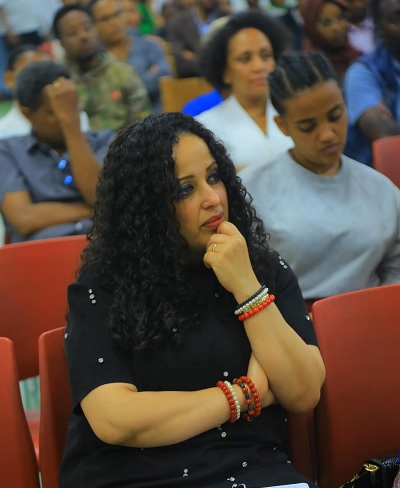
Addis Ababa, a vibrant tapestry woven with the threads of diverse lives, holds a special place in the heart of author Tigst Samuel. Born and raised amidst the bustling energy of the city, Tigst absorbed the rhythms and nuances of her neighborhood, experiences that now inform her compelling literary voice. Her latest book, Ayneregeb, a collection of short stories and poems, serves as a potent reflection of this formative experience.
Tigst’s artistic journey began early. Immersed in the world of words through magazines her father read and inspired by her grandfather, a playwright, she developed a keen eye for detail and a talent for storytelling. Even now, residing in the Netherlands, the sights, sounds, and social dynamics of Merkato, her childhood neighborhood, remains vivid, fueling her creative fire.
Ayneregeb perfectly encapsulates Tigst’s view of her surroundings. Just as a girl observes the world unseen, Tigst, through her writing, offers a penetrating gaze into the heart of the society. Employing a satirical style honed by studying the masters of Russian literature, she deftly exposes the foibles and hypocrisies of those in her community. Her characters, drawn from everyday life, are rendered with vibrant realism, making their struggles and triumphs resonate deeply.
One compelling example is the story of Kifle, a self-proclaimed patriot whose fervent pronouncements of love for Ethiopia’s history and cultural heritage ring hollow when confronted with genuine understanding. In a revealing encounter with well-read and genuine lover of his country, Kifle`s shallowness and lack of respect for his fellow countrymen are laid bare, exposing the disconnect between rhetoric and reality.
Ayneregeb is filled with such insightful narratives, offering a blend of humor and thought-provoking commentary. Initially written in English, the book’s warm reception led to an Amharic translation, further broadening its reach and solidifying Tigst’s place in the Ethiopian literary landscape.
The title story, “Ayneregeb,” offers a particularly view of little girl who observes everything around her without being seen by others. Though little and inexperienced about life, this little has a critical mind that observe things from different angle. Drawing inspiration from literary giants like Nikolai Gogol, Anton Chekov, and Maxim Gorki, the author portrays a young girl navigating the complexities of neighbors and family dynamics. Craving affection in a household where she is often overlooked, she subtly manipulates the adults around her, revealing their hidden weaknesses. The grandmother indifference is another symbol for the little girl’s struggles. She learns to navigate a world where those deemed wise and virtuous often harbor hidden cruelties.
“Amdegnaw” is a darkly comedic tale of Alemu, whose wife’s tragic and unconventional death – crushed by a donkey – becomes a source of public fascination and social commentary. Tigst brilliantly portrays Alemu’s profound grief, compounded by the insensitive scrutiny of the media and community. Driven to despair, he plots his own demise, ironically, ensuring it aligns with societal expectations of bravery. This story highlights Tigst’s talent for using humor to dissect the often-intrusive nature of social dynamics, and how they can profoundly impact individuals.
For Tigst, the central theme in her work revolves on the dichotomy between inherent freedom and societal constraints. She sees humanity as inherently free, but bound by the invisible prison of societal norms. Within this framework, she elevates the observer, the child, as a vital agent of change. Though powerless to openly challenge the established order, the young girl in Ayneregeb uses her sharp wit and keen observation to expose hypocrisy and subtly dismantle the structures that stifle individuality. In this way, Tigst Samuel offers a powerful, insightful, and beautifully crafted portrait of Ethiopian life, reminding us of the enduring power of observation, satire, and the human spirit.
BY LEULSEGED WORKU
THE ETHIOPIAN HERALD FRIDAY 21 FEBRUARY 2025




